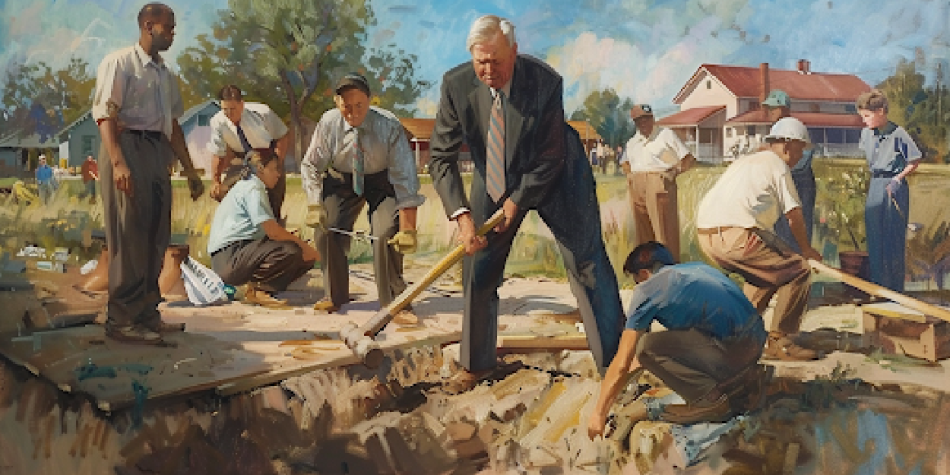In an era marked by skepticism towards institutions, often times leaders of The Church of Jesus Christ of Latter-day Saints often find themselves subjected to this skepticism.
This skeptical approach sees the senior leadership of the Church as the top of a “corporate ladder” of sorts. This perspective takes for granted that senior leaders of the Church aspire to these positions because they benefit from their authority in terms of wealth and power.
This is the same reasoning that allows many to conclude that church leadership works to cover up scandals or abuses, sexual or otherwise, that would damage the brand name of the Church. The governance of the Church is rooted deeply in principles of divine calling.
In addition to the Church’s leadership, the Church does have paid non-ecclesiastical positions, and it is possible to make a career in those paid positions. This article does not get into the nature of advancement and hierarchy within the Church’s paid positions, however important they may be.
The Threat of Careerism
In our modern times, when we talk about “power differentials,” we are ordinarily trying to address how to prevent those in power from abusing their power for their own sake. What we often fail to notice, however, is that when we view roles, relationships, and people within the context of power differentials, we already assume people are inherently self-interested, ignorant of the needs of others, and only pursue their own pleasure. In other words, everyone is fundamentally a careerist. It’s just a matter of who succeeds at it.
Since careerism operates on principles of power, someone with a careerist mindset could assume that the Church also runs on principles of power. As an example of what this assumption might look like, here is a post someone made online about the position of the President of the Quorum of the Twelve. This post was written after the death of President M. Russell Ballard but before the calling of Elder Patrick Kearon at the end of 2023:
Don’t be fooled. President of the Q12 is a very powerful position. They basically oversee and direct church operations. Since Holland is (not well)…might we witness Uchtdorf’s revenge after getting ousted from the First Presidency by Nelson and Oaks? I’m dreaming. Still…it’s fun to dream.
Here, we have the idea that Elder Uchtdorf would take over the position of President of the Quorum of the Twelve since Elder Holland was presumably too unwell to fulfill those duties. From a careerist mindset, where power is primary, this would be an advantage to Elder Uchtdorf because he would be able to use his power as President of the Quorum to get “revenge” for being “ousted” from the First Presidency. There do exist people who are genuine careerists who conceive of the world in terms of power.
Principles of righteousness
Careerism is a real, existing worldview, and there do exist people who are genuine careerists who conceive of the world in terms of power. However, despite how some may view it, the organization of the leadership of the Church is not rooted in power. In fact, the very design of the leadership organization naturally discourages people with a careerist mindset.
Rather than power, the organization of church leadership and authority is rooted in principles of righteousness. D&C 121:36 explains:
That the rights of the priesthood are inseparably connected with the powers of heaven, and that the powers of heaven cannot be controlled nor handled only upon the principles of righteousness.
Verses 41-42 further expound upon these principles:
No power or influence can or ought to be maintained by virtue of the priesthood, only by persuasion, by long-suffering, by gentleness and meekness, and by love unfeigned; by kindness, and pure knowledge, which shall greatly enlarge the soul without hypocrisy, and without guile.
In other words, love, service, and self-sacrifice are the order of the day when it comes to priesthood leadership. All leadership is based on the premise of serving others and God. None of it is based on personal glorification. Thus, it would be difficult for someone who is intent on personal glorification to satisfy that within the Church since, as an organization, it is based on different principles and premises. Such a person will likely be found out, so to speak, and not be given the higher callings he desires because it would not be for the service of others. Additionally, while someone may be called within a higher position, the Lord has made it clear that they lose the authority to exercise His priesthood when they act in pursuit of power or self-interest.
Discouraging careerists

Regardless of the safeguards in place, sometimes, people who aspire for power slip into roles within the Church. There are plenty of members who have had leaders who seem to care more for their position than for their flock. However, the leadership organization, which values service over power, works to thin out those careerists the higher up you go. Love, service, and self-sacrifice are the order of the day.
However, this means that there will always be a surplus of candidates for the next level of callings. There are more bishops available than are needed to fill the stake president callings. It is unlikely that one will obtain a higher-level calling and “move up the ladder.” Of course, regular businesses operate that way, too, but the church leadership also includes the possibility to “move down the ladder.” The Church has always emphasized the equality of all callings—that every position is important. Hence, a bishop is just as likely to serve next as a primary teacher as he is to serve as a stake president. More likely, in fact, since there will always be more primary teachers needed than stake presidents.
Furthermore, with each increase in the level of calling, there is greater scrutiny and expectation of one’s dedication to members, the Church, and God instead of one’s own desires. The doctrine is clear in this case as Jesus declared, “Whosoever will be great among you, shall be your minister: And whosoever of you will be the chiefest, shall be servant of all.”
Additionally, the duties and requirements of priesthood leadership callings in the Church do not easily fulfill the goals and aims of careerism. Recall that careerism strives for i.e., power, authority, and money. All of those things can be obtained in places other than the Church, and usually more easily and with greater success. For example, all of the apostles were highly successful in their careers outside of the Church before they were called into church service. Why would these men want to abandon their worldly careers for the Church? I think it’s unlikely it was to satisfy their supposed careerist itch. They all had money; they all had prestige and authority in their respective careers. President Nelson was already a world-renowned heart surgeon; President Oaks was a Utah supreme court justice; Elder Uchtdorf was a senior vice president for the flight operations of Lufthansa; Elder Cook was the president and CEO of California Healthcare System; Elder Rasband was president and chief operating officer for the Huntsman Chemical Corporation, and so on. The best available evidence suggests living stipends for senior church leadership are about the pay of a corporate middle manager. Church structure does not offer a reliable corporate ladder.
Some might argue that the “gain” is not just power and authority, but specifically power and authority within the Church. This presumes, however, that those currently in leadership positions were able to have them all along, and that is extremely unlikely. Upward mobility is never a guarantee when it comes to church callings. The general pattern of leadership callings covers the span of many years. A bishop is typically bishop for 5-6 years. A stake president is often closer to 10 years. Add to those years some additional callings within the ward (elder’s quorum presidents often serve around 3 years), and you’re dealing with some 20 years of “climbing the leadership ladder” before you might be called to be an area authority, never mind an apostle. Church structure does not offer a reliable corporate ladder the way other careers would. If there is a desire for power and authority within the church specifically, the leadership structure makes it difficult to achieve.
Why are they not chosen?
Joseph Smith taught:
Behold, there are many called, but few are chosen. And why are they not chosen? Because their hearts are set so much upon the things of this world, and aspire to the honors of men, that they do not learn this one lesson—That the rights of the priesthood are inseparably connected with the powers of heaven and that the powers of heaven cannot be controlled nor handled only upon the principles of righteousness (D&C 121:34-36).
The final point to be mentioned is also the most important. In the end, it is not men who lead The Church of Jesus Christ of Latter-day Saints. It is not men who decide who should be called to lead and who should not. It is Jesus Christ.
















